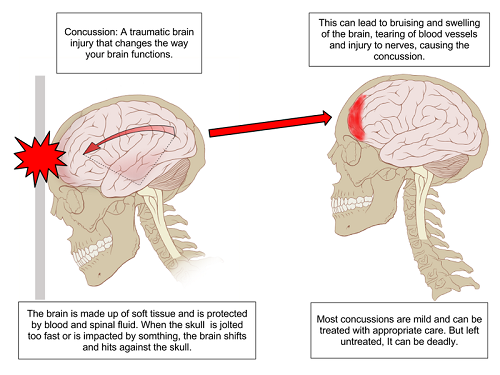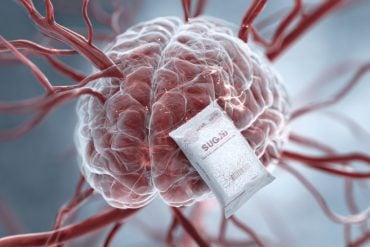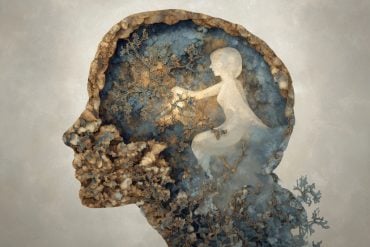As the National Football League braces for lawsuits by 4000 former players alleging the league failed to protect them from the long-term consequences of concussions, game-changing research by a leading Canadian researcher shows damage to the brain can persist for decades after the original head trauma.
“Even when you are symptom-free, your brain may still not be back to normal,” says Dr. Maryse Lassonde, a neuropsychologist and the scientific director of the Quebec Nature and Technologies Granting Agency.
Lassonde, whose work is supported by the Canada Foundation for Innovation, was a consultant with the Montreal Canadiens hockey team, treating players with concussions for 15 years. She simultaneously undertook research into the effects of concussions on children and young athletes as well as older athletes.

The research demonstrates that brain waves remain abnormal in young athletes for two years following a concussion, and atrophy occurs in the motor pathways of the brain following a hit. Credited to Max Andrews.
To study the effects of concussions, Lassonde had athletes perform specific visual and auditory tasks and also mapped their brains with the help of EEG and MRI equipment, in addition to testing brain chemistry.
Her research demonstrates that brain waves remain abnormal in young athletes for two years following a concussion, and atrophy occurs in the motor pathways of the brain following a hit.
The results of her work, which have been published in the journals Brain and Cerebral Cortex, have important implications for the regulation of amateur and professional sports, the treatment of players and the importance of preventing violence in hockey and football.
“That tells you that first of all, concussions lead to attention problems, which we can see using sophisticated techniques such as the EEG,” says Lassonde. “This may also lead to motor problems in young athletes.”
The long-term effects in older former athletes are even more persistent.
By studying older athletes who suffered their last concussion 30 years earlier, and comparing them to healthy peers who had not experienced concussions, Lassonde discovered those who had suffered a head trauma had memory and attention deficits and motor problems similar to the early symptoms of Parkinson’s disease. Further testing of these older athletes turned up a thinning of the cortex in the same regions of the brain that Alzheimer’s disease usually affects.
“This thinning correlated with memory decline and attention decline,” Lassonde says.
In addition to the recovery time required following a concussion, adds that young players who return to their sport too early and suffer a second concussion risk serious brain damage or death.
“If a child or any player has a concussion, they should be kept away from playing or doing any mental exercise until their symptoms abate,” Lassonde says. “Concussions should not be taken lightly. We should really also follow former players in clinical settings to make sure they are not ageing prematurely in terms of cognition.”
Notes about this concussion and neurology research
Dr. Lassonde is presenting as part of the Canada Press Breakfast at the AAAS Annual Meeting on Sunday, February 17th at 7:45 am in room 200 of the Hynes Convention Centre.
Contact: Ryan Saxby Hill – Canada Foundation for Innovation
Source: Canada Foundation for Innovation press release
Image Source: Image credited to Max Andrews via Wikimedia Commons. Licensed as Creative Commons Attribution-Share Alike 3.0 Unported.
Original Research: Full open access research for “Brain function decline in healthy retired athletes who sustained their last sports concussion in early adulthood” by Louis De Beaumont, Hugo Théoret, David Mongeon, Julie Messier, Suzanne Leclerc, Sébastien Tremblay, Dave Ellemberg and Maryse Lassonde in Brain. Published online January 28 2009 doi: 10.1093/brain/awn347
Abstract for “Sports Concussions and Aging: A Neuroimaging Investigation” by Sebastien Tremblay, Louis De Beaumont, Luke C. Henry, Yvan Boulanger, Alan C. Evans, Pierre Bourgouin, Judes Poirier, Hugo Théoret and Maryse Lassonde in Cerebral Cortex. Published online May 10 2012 doi: 10.1093/cercor/bhs102
Full open access research for “Altered Bidirectional Plasticity and Reduced Implicit Motor Learning in Concussed Athletes” by Louis De Beaumont, Sébastien Tremblay, Judes Poirier, Maryse Lassonde and Hugo Théoret in Cerebral Cortex. Published online May 13 2011 doi: 10.1093/cercor/bhr096






